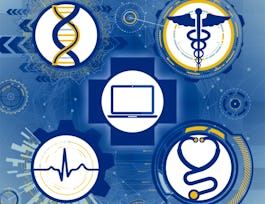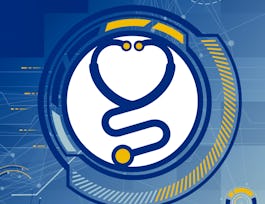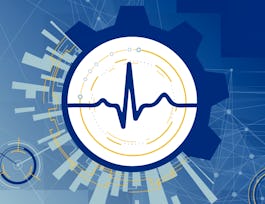Improving health and healthcare institutions requires understanding of data and creation of interventions at the many levels at which health IT interact and affect the institution. These levels range from the external “world” in which the institution operates down to the specific technologies. Data scientists find that, when they aim at implementing their models in practice, it is the “socio” components that are both novel to them and mission critical to success. At the end of this course, students will be able to make a quick assessment of a health informatics problem—or a proposed solution—and to determine what is missing and what more needs to be learned.



The Social and Technical Context of Health Informatics
This course is part of Health Informatics Specialization

Instructor: Harold P. Lehmann, MD, Ph.D.
Sponsored by Mojatu Foundation
37,297 already enrolled
(497 reviews)
Recommended experience
What you'll learn
Articulate a coherent problem definition of, and a plan for addressing, a healthcare informatics problem.
Create an Informatics Stack analysis of an informatics problem.
Describe eleven socio-technical aspects of a health informatics problem or solution.
Skills you'll gain
Details to know

Add to your LinkedIn profile
4 assignments
See how employees at top companies are mastering in-demand skills

Build your subject-matter expertise
- Learn new concepts from industry experts
- Gain a foundational understanding of a subject or tool
- Develop job-relevant skills with hands-on projects
- Earn a shareable career certificate


Earn a career certificate
Add this credential to your LinkedIn profile, resume, or CV
Share it on social media and in your performance review

There are 4 modules in this course
In this module, you will be given an introduction to the course and its foundational concepts. After providing examples of health IT in the contexts of patients, providers, and populations—the three contexts we always return to—we articulate the drivers that motivate developments in health IT and informatics. We then provide the core definitions of key terms (like “health IT” and “informatics”) and introduce the core framework for your work in this course, the Informatics Stack.
What's included
11 videos1 reading1 assignment
In this module, we start our journey down the Stack to explain the world of informatics and health IT. We explore the top four levels of the Stack (World, Organization, Roles, and Functions), and then proceed to discuss new US medical-care (“World”) policies that drive health care Organizations to change practice, so they can accomplish their core Functions. We also discuss the history of health IT in relation to such policies in the past. We begin a course-long discussion of interoperability (which occurs at each level of the Stack), and privacy/confidentiality/security. We end with an explication of methods used to Evaluate whether an IT project has achieved the Organizational goals set for that project.
What's included
6 videos1 assignment
In this module, we continue the journey, starting with the role of needs, requirements, and specifications. We then turn to how workflow issues are turned into requirements and how information systems, built to satisfy those requirements, are assembled. We close with the cautionary notes of how poorly built systems harm the very workflows they were designed to improve.
What's included
6 videos1 assignment
This module concludes our journey with discussions of Data, Information, Knowledge, and Technology. Regarding data, we discuss their sources and types and provide examples. We go on to explain differences between information and data, and between knowledge and information. Standards are most important at this level, and we discuss the exchange of text and imaging data. Regarding technology, we use the Hype Cycle as a way for you to keep track of what new technologies are doing what and when. We close with a framework for thinking about careers in health IT and informatics.
What's included
11 videos1 assignment1 peer review
Instructor

Offered by
Why people choose Coursera for their career




Learner reviews
497 reviews
- 5 stars
59.35%
- 4 stars
22.13%
- 3 stars
9.05%
- 2 stars
3.21%
- 1 star
6.23%
Showing 3 of 497
Reviewed on Jul 13, 2019
Very good information and the teaching material is easy to process and understand. I think the stack is a brilliant method to assess and to learn it is one of the important aspects of informatics.
Reviewed on Nov 28, 2020
I am incredibly impressed with this course. I have enjoyed Harold P. Lehmann, MD, PH.D videos. I am grateful for the opportunity to take this course.
Reviewed on Sep 24, 2023
This was a great foundational course for Healthcare IT and introduction to the Electronic Healthcare System
Recommended if you're interested in Health

Johns Hopkins University

Johns Hopkins University

Northeastern University

Johns Hopkins University

Open new doors with Coursera Plus
Unlimited access to 10,000+ world-class courses, hands-on projects, and job-ready certificate programs - all included in your subscription
Advance your career with an online degree
Earn a degree from world-class universities - 100% online
Join over 3,400 global companies that choose Coursera for Business
Upskill your employees to excel in the digital economy


